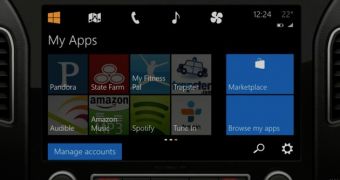Windows in the Car is not a new concept, as the company previously presented such a project in April 2014, but it turns out that now, with the arrival of Windows 10, the company’s finally ready to start over and bring its new operating in our vehicles in the coming years.
The software giant’s looking for partners in Taiwan that would help it create what are being called “connected cars,” which are essentially vehicles whose key capabilities rely on a personal assistant. In our case, Cortana is supposed to take care of everything in your car, letting you enjoy driving when getting behind the wheel.
Samuel Shen, chief operating officer at the Microsoft Asia-Pacific Research and Development Group, has revealed that a prototype of a connected car powered by Cortana has already been developed, but no public demonstration is available for the time being.
Shen confirms, however, that Cortana can take care of the usual stuff, such as the navigation or audio system, with voice commands, so you can simply say “Hey Cortana, show me directions to my office” and the personal assistant automatically searches for a route.
The cost challenge
What’s more, Cortana can take voice control further and take care of even more advanced things, such as restaurant reservations or buying concert tickets. Basically, you should be able to perform the same things with Cortana in your car as on Windows 10 or on Windows 10 Mobile.
“We have not launched similar products due to the high cost, but we hope to have further discussions with Taiwanese partners to jointly explore future possibilities,” Shen is quoted as saying by Taipei Times.
The previous Windows in the Car concept demoed by Microsoft in 2014 was based on a Windows Phone device that took over the in-car display and offered access to phone features, but this time, Redmond’s willing to go for something bigger with Cortana directly integrated into the car’s infotainment system. This could be possible with Windows 10 IoT and Windows 10 Embedded, but it remains to be seen if Microsoft’s indeed ready to bring such technology in mass production and find a way to address the cost issue.
Obviously, you’d have to grant Cortana access to some of your car’s functions, which could sound terrifying for many people, and agree with some privacy terms that most likely include sending the voice commands you pronounce to Microsoft “to improve its services.”

 14 DAY TRIAL //
14 DAY TRIAL // 